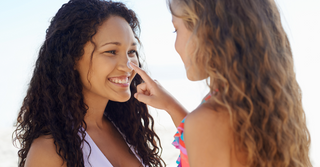Okay, so this was supposed to be a simple summer skincare post, but then I kept getting frantic messages from parents about sunscreen and eczema. Suddenly, I realized the internet is packed with total garbage advice on this topic, and I had to say something.
I've been writing about skincare for years, and while I'm obviously not a dermatologist, I've talked to plenty of them. The misinformation out there about protecting eczema-prone babies from the sun is honestly ridiculous. Let me cut through nonsense.
Myth #1: "Babies with eczema can't use sunscreen at all"
This is the one that makes me want to bang my head against a wall, quite frankly. It's not only wrong, it's potentially dangerous.
Here's the thing: babies with eczema actually need sun protection MORE than other babies because their skin barrier is already compromised. Think of it like having a broken umbrella in a rainstorm - you need extra protection, not less.
Yes, finding the right sunscreen can be a faff. Yes, some will make their skin worse. But throwing in the towel entirely? Absolutely not. You need mineral sunscreens - zinc oxide or titanium dioxide - that sit on top of the skin rather than sinking in. They're less likely to cause irritation because they're not trying to penetrate that already-struggling skin barrier.
Look for products specifically formulated for sensitive skin (not just "baby" sunscreens, which can still contain irritating ingredients), and always, ALWAYS do a patch test first. I cannot stress this enough. A little dab behind the ear, wait 24 hours, see what happens. It's boring but it works.
Myth #2: "Higher SPF equals more irritation"
Nope. This is skincare mythology at its finest.
The SPF number itself doesn't make sunscreen more irritating - it's all the other rubbish they sometimes chuck in there. Chemical UV filters, fragrances, preservatives that would make your eyes water, alcohol that's drying as anything - THOSE are your culprits, not the protection level.
A well-formulated SPF 50 mineral sunscreen can be just as gentle as an SPF 15. In fact, I'd argue it's better because you get more protection with less frequent reapplication, which means less rubbing and faffing about on already irritated skin. And let's be honest, when you're dealing with a wriggly baby who's having an eczema flare, the last thing you want is to be constantly reapplying product.
Myth #3: "You can make sunscreen at home"
Oh, this old chestnut. Look, I get the appeal - when your baby's skin is angry and inflamed, "natural" sounds like the answer to all your problems. But here's the uncomfortable truth: you cannot make effective sunscreen in your kitchen. You just can't.
Homemade sunscreens are a complete lottery when it comes to protection levels. You might think you're slathering on SPF 30 but actually getting SPF 3, which means your baby could end up with burns on top of their existing skin issues. It's not worth the risk.
I've seen coconut oil recommended as a natural SPF. Just because something grows in the ground doesn't mean it's suitable for compromised skin. Formulation is more complicated than just putting good ingredients together.
Myth #4: "Skip sunscreen during active flares"
This one makes me want to weep because I understand the logic - when skin is raw and angry, the last thing you want to do is put more products on it. But inflamed, broken skin is incredibly vulnerable to UV damage, which can actually make the flare worse and take longer to heal.
The trick is to be strategic about it. Apply any prescribed medications first, let them sink in properly, then use the absolute minimum amount of mineral sunscreen on exposed areas only. And honestly? This is where covering up becomes your best friend. Long-sleeved rashies, wide-brimmed hats, UV umbrellas - anything to reduce the amount of skin that needs sunscreen protection.
I'm not saying slather the poor child in product when they're already miserable. I'm saying protect them cleverly and minimally.
Myth #5: "Water-resistant sunscreen is too harsh"
Some water-resistant formulas are perfectly gentle mineral sunscreens that happen to stick around longer when wet. Others are loaded with film-forming chemicals that could irritate sensitive skin. You can't make blanket statements about them being "too harsh" - you have to read the ingredients.
For beach or pool days with eczema babies, I'd honestly lean heavily into UV-protective swimwear. Cover as much skin as possible with UPF clothing so you can use minimal sunscreen on just the exposed bits - face, hands, feet.
The Bottom Line (Because I'm Getting a Bit Ranty)
Look, protecting a baby with eczema from the sun doesn't have to be a nightmare. It requires a bit more thought and preparation than slapping any old sunscreen on them, but it's absolutely doable.
Choose broad-spectrum mineral formulations, avoid obvious irritants like fragrances and drying alcohols, do patch tests, and remember that physical protection (clothing, shade, timing) is often more effective and less fussy than relying solely on topical products.
And please, PLEASE talk to your pediatric dermatologist. They see this stuff day in and day out, and they can recommend specific products that work well with whatever treatment plan your baby is already on.
The goal isn't to get perfect skin but to have protected skin. There's a difference, and once you embrace that, the whole thing becomes much less stressful.
This is educational content, not medical advice. Always consult your healthcare provider before making changes to your baby's routine - especially if they're currently using prescribed treatments.

